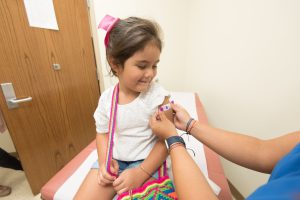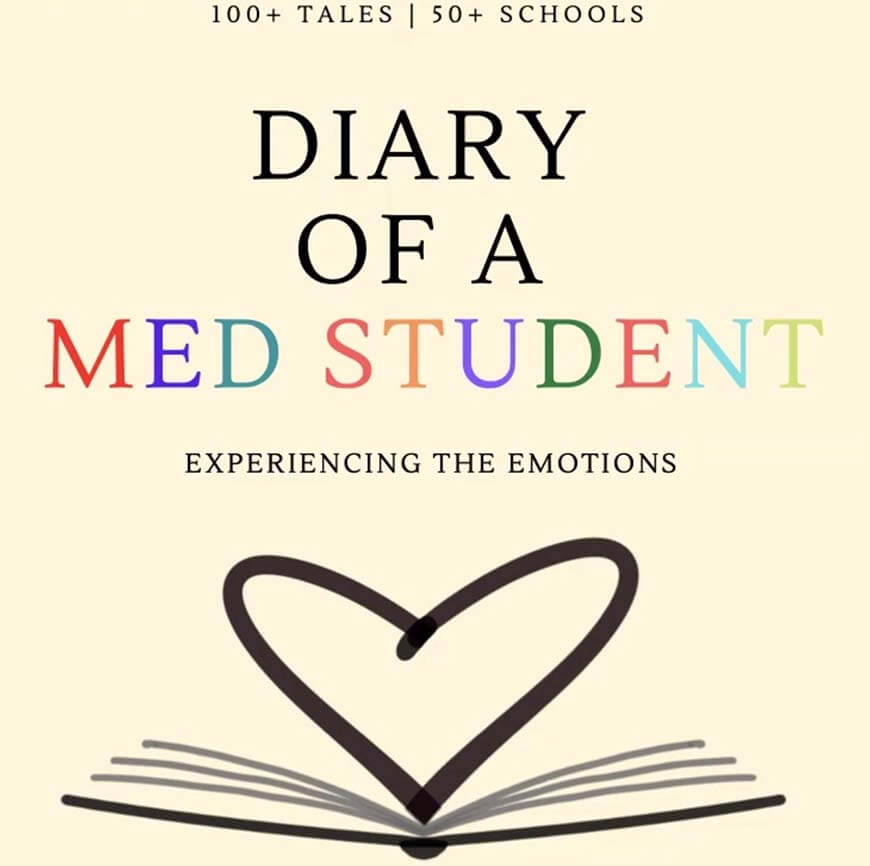Though most students have a general idea of how their medical school journey may unfold, it is virtually impossible to prepare for all the unexpected, and often incredibly personal, moments that make it all up.
Daniel Azzam and Ajay Sharma—med students themselves at the University of California, Irvine—had the very thought in mind when they set about writing ‘Diary of a Med Student’, now available via Amazon.
Inspired by the “inspiring, traumatic, joyful, and sometimes even humorous events” that they experienced or encountered, Azzam and Sharma penned more than 100 brief stories in the recently released 212-page book.
[It is] an encouraging reminder for med students and doctors that their experiences matter and that they are not alone.
Equal parts raw and strikingly familiar to those involved in medicine, Dr. Dustyn Williams—OnlineMedEd‘s co-founder and lead educator—described ‘Diary of a Med Student’ as an “important and relatable” collection.
“[It is] an encouraging reminder for med students and doctors that their experiences matter and that they are not alone,” Williams said.
“The entries are haiku-like in their economy, yet speak so eloquently about the experience,” Dr. Abraham Verghese, a prominent Professor of Medicine at Stanford University said.
“The variety astonishes me, as does the ability to capture the challenges and indignities that are inevitable in pursuing this calling, as well as our shock and despair on witnessing human suffering.
“The wisdom and insight in this collection will surprise you. It bodes well for the future of our profession.”
With thanks to Azzam and Sharma, OnlineMedEd has been granted permission to share a special selection from ‘Diary of a Med Student.’ We’ve included three of our favorite stories below. Enjoy.
Minutiae
It took me nearly a year to realize why I was getting so little out of medical school.
It wasn’t that I was putting too little into it. Rather, it was that I was putting too much into the little things.
One more nerve. One more mechanism. One more factoid. What if these show up on the exam?
I was not learning to prepare myself to care for patients; I was learning to pass a test. Cram, regurgitate, forget; repeat.
The grandeur of life was always right in front of me, but I had made mine small. What if I don’t pass this exam? Back to the lectures.

But somehow, life routinely brings me back to itself. Frequently, my little world is punctuated by invitations back to the Big World.
Wait, do I need to know this for the exam? A patient erupts in tears before me as she shares that her sister has died.
I’m so stressed out by this upcoming presentation. My mom calls; her father passed this morning.
How high-yield is this for STEP1? My friend is thinking about harming himself; he refuses to seek care for his depression.
The Little I Could Offer
It was early Saturday morning as we neared the end of our rounding list when we entered Ms. K’s room.
She was 24 hours into her recovery, and was already awake and reading, her foot bobbing off the side of the bed metronomically.
She thanked the team profusely for the prior day’s operation. But as we told her the brief plan of continuing pain control, ambulating, and advancing her diet, her facial expression shifted and her foot stilled.
I’m only a medical student, but how about I pull up the note from the operation and we can see what your surgeon said?” Ms. K’s face lit up with excitement. The little I could offer, was the little that she needed.
“Hey… umm is there any way of knowing how much small bowel they had to take yesterday? Or how much is left?” Ms. K inquired with hesitation, half stumbling on her words.
“I’m sorry, but I wasn’t the surgeon that did your operation” the attending hastily replied, halfway out the doorway.
I looked back as we filed out of the room; Ms. K now sat on her bed, her head down, legs frozen.
I circled back to visit Ms. K after the last patient was rounded on. She explained to me that she used to work for the Department of Public Health, and was very familiar with PubMed and other medical literature that she had access to through her career.
Up until her battle with ovarian cancer, Ms. K had found her health literacy a helpful tool – she struggled with anxiety and her main coping mechanism was to learn more about whatever was causing her stress.
However, now she was in a position where the EHR system and surgeons possessed the information that would help her. Her treatment was inaccessible.
“I’m not worried about getting bad news, I just want to know where I stand so I can start planning and envisioning my future… I feel unprepared.”

“I’m a nervous wreck. I can’t accept a new normal without knowing what that new normal will entail. Not knowing is driving me up the wall” Ms. K said, her voice crescendoing with emotion.
We sat together for a moment in silence, and then I had an idea. My fingers pecked at the keyboard as I logged into the EHR system.
“I’m only a medical student, but how about I pull up the note from the operation and we can see what your surgeon said?”
Ms. K’s face lit up with excitement. The little I could offer, was the little that she needed.
I opened the note and she began to read, her foot bobbing once again.
Wake Up the Warriors!
“We gave Molly the Neupogen shot, but it took two residents, two nurses, and her mom holding her down while she fought against us.”
I listened with a blend of amusement and horror as the night team relayed the grand efforts it took to give one shot to a fierce little girl who absolutely hated needles.
Molly was an eight-year old with a complex medical history who was in the hospital because her white blood cells were dangerously low, so much so that even the most harmless bacteria could cause a life-threatening illness.
The Neupogen shots would stimulate her bone marrow to produce more white blood cells so that she’d be safe to go home.
“NO SHOTS!” Molly screamed repeatedly, tears rolling down her cheeks. As a medical student, I had one secret weapon that no one else on my team had: time.
During rounds that morning, I learned that Molly’s white blood cells had an encouraging rise in response to the shot, and she would be sent home that day. But Molly would need another shot to be administered by her parents at home.
How will her mother react when I tell her she’ll need 4 people and a nurse’s skill level to deliver the shot?
Molly and her mom’s faces went through a full spectrum of emotions as I let them know first the good news, then the bad.
“NO SHOTS!” Molly screamed repeatedly, tears rolling down her cheeks. As a medical student, I had one secret weapon that no one else on my team had: time. I pulled up a chair and tried to level with her.
“Has anyone explained to you why you need these shots?” Molly shook her head no. “Everyone is just trying to hurt me!”
“Of course not!” I exclaimed. I proceeded to tell her a story about white blood cell warriors that fight off the bad guy germs that get kids sick. I told her how her warriors were asleep, and these shots would help wake them up so she wouldn’t get sick again.
Molly looked at me skeptically. “Are you sure the shot will wake up my warriors?” she asked.
“Well, it sure woke them up last night, didn’t it?” I retorted.

Molly pondered this for a second, eyes widening as she put her little hand on her chin, and said: “That’s true. I want my warriors to wake up!”
Molly’s mom thanked me as I left the room for helping reduce her daughter’s resistance to shots, even if just a little bit.
I had a bounce in my step as I walked out of Molly’s room that day. It felt amazing to be able to make this little girl feel included in her own care.
Though saying goodbye was hard, I knew Molly would be safe at home. She had an army of warriors behind her.



